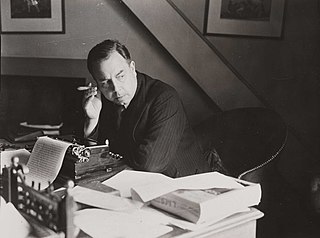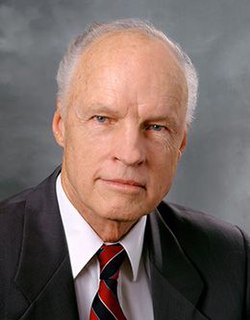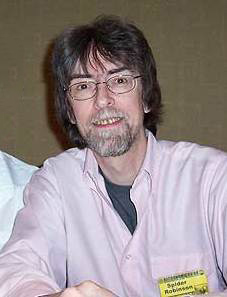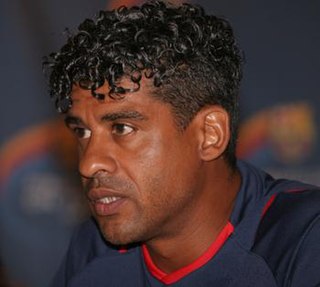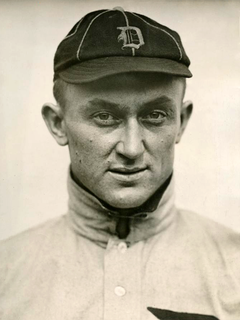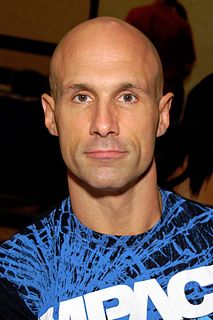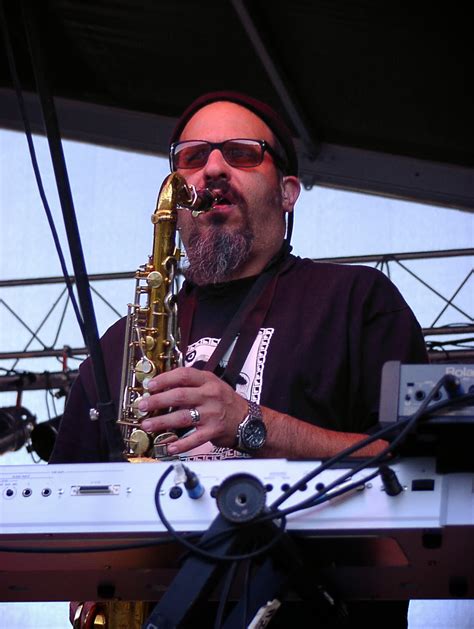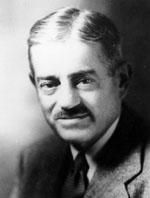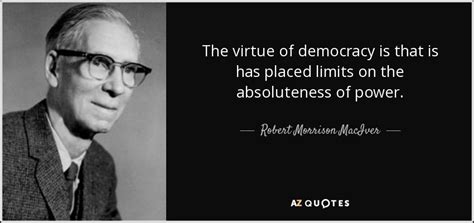Top 1200 Grasp Quotes & Sayings - Page 20
Explore popular Grasp quotes.
Last updated on April 20, 2025.
The daimonic refers to the power of nature rather than the superego, and is beyond good and evil. Nor is it man's 'recall to himself' as Heidegger and later Fromm have argued, for its source lies in those realms where the self is rooted in natural forces which go beyond the self and are felt as the grasp of fate upon us. The daimonic arises from the ground of being rather than the self as such.
In a sense, I never got over Robert Lowell's History. A flawed, infinitely brilliant project I never tire of going back to. It's a modern Inferno, where Lowell plays both Dante and Virgil, guiding us through dozens of illuminating, bitter episodes from human history, all the while managing to hold a mirror to our confused hominid face as it squints at eternity and fails to grasp any of it.
Suffering is by no means a privilege, a sign of nobility, a reminder of God. Suffering is a fierce, bestial thing, commonplace, uncalled for, natural as air. It is intangible; no one can grasp it or fight against it; it dwells in time - is the same thing as time; if it comes in fits and starts, that is only so as to leave the sufferer more defenseless during the moments that follow, those long moments when one relives the last bout of torture and waits for the next.
...the mind is more powerful than any imaginable particle accelerator, more sensitive than any radio receiver or the largest optical telescope, more complete in its grasp of information than any computer: the human body- its organs, its voice, its powers of locomotion, and its imagination- is a more-than-sufficient means for the exploration of any place, time or energy level in the universe.
Maybe I’m drunk right now, even though I don’t remember drinking anything. When I’m drunk, I say things without thinking. Drinking numbs you from your ability to reason. It makes you forget your own character and become a crazy. Maybe I am a crazy now; I’m going through so much chaos these days that reality is hard to grasp.
We often wonder why God gives and takes, constricts and expands. What we forget is that human beings understand things by their opposites. Without dark, we can’t understand light. Without hardship, we wouldn’t *experience* ease. Without the existence of deprivation and loss, we couldn’t grasp the need for gratitude or the virtue of patience. And without separation, we wouldn’t taste the sweetness of reunion. Glory be to the one who gives—even when He takes.
In a word, the Holy Scripture is the highest and best of books, abounding in comfort under all afflictions and trials. It teaches us to see, to feel, to grasp, and to comprehend faith, hope, and charity, far otherwise than mere human reason can; and while evil oppresses us, it teaches how these virtues throw light upon the darkness, and how, after this poor, miserable existence of ours on earth, there is another and an eternal life.
People never grasp the fact that they're going to have to go through the same thing again. They get to the sort of five-year stretch or the seven-year itch or whatever these tension points are that seem to be organic, built in, like the tide coming in and going out. It's like every time the tide goes out you quit--you move your house or something.
I want to unfold. I don't want to stay folded anywhere, because where I am folded, there I am a lie, and I want my grasp of things to be true. I want to describe myself like a painting that I looked at closely for a long time,
like a saying that I finally understood, like the pitcher I use every day,
like the face of my mother, like a ship that carried me through the wildest storm of all.
The other book that I worry no one reads anymore is James Joyce's Ulysses. It's not easy, but every page is wonderful and repays the effort. I started reading it in high school, but I wasn't really able to grasp it. Then I read it in college. I once spent six weeks in a graduate seminar reading it. It takes that long. That's the problem. No one reads that way anymore. People may spend a week with a book, but not six.
I thought, when I came upon her, that I was seizing hold of life... Instead I lost hold of life completely. I reached out for something to attach myself to - and I found nothing. But in reaching out, in the effort to grasp, to attach myself, left high and dry as I was, I nevertheless found something I had not looked for - myself.
One of the delights beyond the grasp of youth is that of Not Going. Not to have an invitation for the dance, the party, the picnic, the excursion is to be diminished. To have an invitation and then not to be able to go -- oh cursed spite! Now I do not care the rottenest fig whether I receive an invitation or not. After years of illusion, I finally decided I was missing nothing by Not Going. I no longer care whether I am missing anything or not.
Do you think that Hemingway knew he was a writer at twenty years old? No, he did not. Or Fitzgerald, or Wolfe. This is a difficult concept to grasp. Hemingway didn't know he was Ernest Hemingway when he was a young man. Faulkner didn't know he was William Faulkner. But they had to take the first step. They had to call themselves writers. That is the first revolutionary act a writer has to make. It takes courage. But it's necessary
Since we are provided with both a body and a mind, we grasp onto the physical forms we see. Since we are provided with both a body and a mind, we cling to the sounds we hear. As a consequence, we make ourselves inseparable from all things, yet we are not like some shadowy figure 'lodging' in a mirror or like the moon in water. Whenever we witness what is on the one side, its opposite side will be in darkness.
In my early life, and probably even today, it is not sufficiently understood that a child's education should include at least a rudimentary grasp of religion, sex, and money. Without a basic knowledge of these three primary facts in a normal human being's life --subjects which stir the emotions, create events and opportunities, and if they do not wholly decide must greatly influence an individual's personality --no human being's education can have a safe foundation.
It does not matter that only a few in each generation will grasp and achieve the full reality of man's proper stature-and the rest will betray it. It is those few that move the world and give life its meaning-and it is those few that I have always sought to address. The rest are no concern of mine; it is not me or "The Fountainhead" that they will betray: it is their own souls.
The spectacular landscape circling the fortress supplies an essential backdrop, inspiring dreamers to wander its ruins for the sake of it; North American tourists, bound down by their practical world view, are able to place those members of the disintegrating tribes they may have seen in their travels among these once-living walls, unaware of the moral distance separating them, since only the semi-indigenous spirit of the South American can grasp the subtle differences.
A physician should take his fee without letting his left hand know what his right is doing; it should be taken without a thought, without a look, without a move of the facial muscles; the true physician should hardly be aware that the last friendly grasp of the hand has been made more precious by the touch of gold
Christian socialism”). This is a difficult concept for modern liberals to grasp because they are used to thinking of the progressives as the people who cleaned up the food supply, pushed through the eight hour workday, and ended child labor. But liberals often forget that the progressives were imperialists, at home and abroad. They were the authors of Prohibition, the Palmer Raids, eugenics, loyalty oaths, and, in its modern incarnation, what many call “state capitalism.
I raise my left arm and twist my neck down to rip off the pill on my sleeve. Instead my teeth sink into flesh. I yank my head back in confusion to find myself looking into Peeta’s eyes, only now they hold my gaze. Blood runs from the teeth marks on the hand he clamped over my nightlock. “Let me go!” I snarl at him, trying to wrest my arm from his grasp. “I can’t,” he says.
I've never changed my approach to acting. I've always felt like I've gotten better. I think that all of us can get better. I feel like, in my acting, I'm better than I was three pictures ago. I think about it. I'm a slow study. It takes me a long time to grasp the material, in order to perform it. But when I come to the set, on the first day, I know the whole movie. That's why I have to start early.
We are most blessed when we see ourselves as we are seen by [the Savior] and know ourselves as we are known by Him. In this world, we do not really grasp who we are until we know whose we are. The Lord says, 'I will not forget you. I have graven you on the palms of my hands' (see Isaiah 49:15-16). He will never forget us nor our real identity. [And, neither should we ever] forget whose we are. We are His.
A lot of people in the jazz community are looking at how much notoriety we're getting. And we're an inspiration to a lot of young people, because now there's something new they can aim for that's in their grasp. Because a lot of times when you attend a jazz college it's all about the history, none of the teachers there are forward-thinking, for the most part, so they don't teach you how to be yourself and embrace the music around you.
But the knowledge and love of our Divine Redeemer, of which we were the object from the first moment of His Incarnation, exceed all that the human intellect can hope to grasp. For hardly was He conceived in the womb of the Mother of God, when He began to enjoy the Beatific Vision, and in that vision all the members of His Mystical Body were continually and unceasingly present to Him, and He embraced them with His redeeming love
This is what it is to be human: to see the essential existential futility of all action, all striving -- and to act, to strive. This is what it is to be human: to reach forever beyond your grasp. This is what it is to be human: to live forever or die trying. This is what it is to be human: to perpetually ask the unanswerable questions, in the hope that the asking of them will somehow hasten the day when they will be answered. This is what it is to be human: to strive in the face of the certainty of failure. This is what it is to be human: to persist.
We did everything we could to win this game on a tricky pitch. We created a lot of opportunities but between the posts and Bonano, we failed to find the goal. We did well but we let a victory slip from our grasp. I still think we are carrying on where we left off last season and you saw a team that was working for 90 minutes. We showed off our talent but just couldn't get a goal.
I think you too recognize the important relationship between philosophy and art, and it is just this relationship that most painters deny. The great masters do grasp it, unconsciously; but I believe that a painter's conscious spiritual knowledge will have a much greater influence upon his art, and that it would be due only to a weakness in him, or lack of genius, should this spiritual knowledge be harmful to his art.
As we attend the temple, there can come to us a dimension of spirituality and a feeling of peace which will transcend any other feeling which could come into the human heart. We will grasp the true meaning of the words of the Savior when He said: “Peace I leave with you, my peace I give unto you. … Let not your heart be troubled, neither let it be afraid.”
In other words, the real problem is not exterior. The real problem is interior. The real problem is how to get people to internally transform, from egocentric to sociocentric to worldcentric consciousness, which is the only stance that can grasp the global dimensions of the problem in the first place, and thus the only stance that can freely, even eagerly, embrace global solutions.
Without question, we need to disarm Saddam Hussein. He is a brutal, murderous dictator, leading an oppressive regime ... He presents a particularly grievous threat because he is so consistently prone to miscalculation ... And now he is miscalculating America's response to his continued deceit and his consistent grasp for weapons of mass destruction ... So the threat of Saddam Hussein with weapons of mass destruction is real.
Other animals can make sounds, and sounds can indicate pleasure and pain. But language, a distinctly human capacity, isn´t just for registering pleasure and pain. It´s about declaring what is just and what is unjust, and distinguishing right from wrong. We don´t grasp these things silently, and then put words to them; language is the medium through which we discern and deliberate about the good.
The historian is looked upon as objective when he measures the past by the popular opinions of his own time, as subjective when he does not take these opinions for models. That man is thought best fitted to depict a period of the past, who is not in the least affected by that period. But only he who has a share in building up the future can grasp what the past has been, and only when transformed into a work of art can history arouse or even sustain instincts.
We've bought into the idea that education is about training and "success," defined monetarily, rather than learning to think critically and challenge. We should not forget that the true purpose of education is to make minds, not careers. A culture that does not grasp the vital interplay between morality and power, which mistakes management techniques for wisdom, which fails to understand that the measure of a civilization is its compassion, not its speed or ability to consume, condemns itself to death.
We have become too civilized to grasp the obvious. For the truth is very simple. To survive you often have to fight, and to fight you have to dirty yourself. War is evil, and it is often the lesser evil. Those who take the sword perish by the sword, and those who don't take the sword perish by smelly diseases.
The longer I live, the longer I realize that batting is more a mental matter than it is physical. The ability to grasp the bat, swing at the proper time, take a proper stance; all these are elemental. Batting is rather a study in psychology, a sizing up of a pitcher and catcher and observing little details that are of immense importance. It's like the study of crime, the work of a detective as he picks up clues.
The past slips from our grasp. It leaves us only scattered things. The bond that united them eludes us. Our imagination usually fills in the void by making use of preconceived theories...Archaeology, then, does not supply us with certitudes, but rather with vague hypotheses. And in the shade of these hypotheses some artists are content to dream, considering them less as scientific facts than as sources of inspiration.
Dance. Dance for the joy and breath of childhood. Dance for all children, including that child who is still somewhere entombed beneath the responsibility and skepticism of adulthood. Embrace the moment before it escapes from our grasp. For the only promise of childhood, of any childhood, is that it will someday end. And in the end, we must ask ourselves what we have given our children to take its place. And is it enough?
I would argue that if you understand how the cells of the brain are organized into circuits, almost computational circuits if you will, and we see how information flows through those circuits and how it's transformed, we might have a much firmer grasp on why our brains make decisions the way that they do. If we get a handle on that, maybe we can overcome some of our limitations and at the very least we'll understand why we do what we do.
It is my assumption that growth in faith is the root of all spiritual growth and is prior to all disciplines of works. True spirituality is not a superhuman religiosity; it is simply true humanity released from bondage to sin and renewed by the Holy Spirit. This is given to us as we grasp by faith the full content of Christ's redemptive work: freedom from the guilt and power of sin, and newness of life through the indwelling and outpouring of his Spirit.
Why did the old Persians hold the sea holy? Why did the Greeks give it a separate deity, and own brother Jove? Surely all this is not without meaning. And still deeper the meaning of that story of Narcissus, who because he could not grasp the tormenting mild image he saw in the fountain, plunged into it and was drowned. But that same image, we ourselves see in all rivers and oceans. It is the image of the ungraspable phantom of life; and this is the key to it all.
Promenade was totally driven by the context. The internal relationships of measurement and placement related to the central axis of the site. The placement of the rectangular plates followed a strict logic in that the plates tilted away and towards the center line in an asymmetrical counterpoint. However, the perception of the sculpture contradicts the logic of its relation to the site. As you walk inbetween the plates you see fragments, you see the work in part, you cannot grasp the whole.
Whensoever, therefore, the legislative shall transgress this fundamental rule of society, and either by ambition, fear, folly, or corruption, endeavour to grasp themselves, or put into the hands of any other, an absolute power over the lives, liberties, and estates of the people, by this breach of trust they forfeit the power the people had put into the hands... and it devolves to the people, who have a right to resume their original liberty, and... provide for their own safety and security.
When we sit down to meditate, we connect with something unconditional - a state of mind, a basic environment that does not grasp or reject anything. Meditation is probably the only activity that doesn't add anything to the picture. Everything is allowed to come and go without further embellishment. Meditation is a totally nonviolent, non aggressive occupation. Not filling the space, allowing for the possibility of connecting with unconditional openness - this provides the basis for real change.
Because I'm sort of an honorary Canadian, I don't think the others grasped the cultural significance of who the Tragically Hip were before the tour. Talking to Sheryl Crow and her people and the guys in Wilco, everyone was ecstatic to be on the tour, it was a lot of fun. But it even took me a while to grasp the idea that this is not just a band, this is a cultural artifact, what the Hip means in Canada. There is nobody else like them.
By patience and determination, rather than by a harsh upsetting of tradition, we move toward our national aspirations.... This is the way we get things done in America. One man tells another, does what he can, till the sum of these efforts grows into a national aspiration-a precious goal. Then occurs our miracle of democracy: because the groundwork has been surely laid, the goal is already within our grasp.
And so I began to read,' Sorkar said. 'And at first the complete works were like a jungle, the language was quicksand. Metaphors turned beneath my feet and became biting snakes, similes fled from my grasp like frightened deer, taking all meaning with them. All was alien, and amidst the hanging, entangling creepers of this foreign grammar, all sound became a cacophany. I feared for myself, for my health and sanity, but then I thought of my purpose, of where I was and who I was, of pain and I pressed on.
I think we need to find a way to provide people with a reason that the average man on the street can grasp and embrace, that would cause him to move away from the centuries-old idea of the individual and individualism, and move toward a different concept of what it means to be human in a collective society. Unless he has that reason, unless he has a fundamental reason to do that, it's going to be very difficult to cause him to make that shift, in my view.
One of the main purposes of laws in a democratic society is to put burdens upon intelligence and reduce it to impotence. Ostensibly, their aim is to penalize anti-social acts; actually their aim is to penalize heretical opinions. At least ninety-five Americans out of every 100 believe that this process is honest and even laudable; it is practically impossible to convince them that there is anything evil in it. In other words, they cannot grasp the concept of liberty.
To invent a story, or admirably and thoroughly tell any part of a story, it is necessary to grasp the entire mind of every personage concerned in it, and know precisely how they would be affected by what happens; which to do requires a colossal intellect: but to describe a separate emotion delicately, it is only needed that one should feel it oneself; and thousands of people are capable of feeling this or that noble emotion, for one who is able to enter into all the feelings of someone sitting on the other side of the table.
In mathematics ... we find two tendencies present. On the one hand, the tendency towards abstraction seeks to crystallise the logical relations inherent in the maze of materials ... being studied, and to correlate the material in a systematic and orderly manner. On the other hand, the tendency towards intuitive understanding fosters a more immediate grasp of the objects one studies, a live rapport with them, so to speak, which stresses the concrete meaning of their relations.
Our vision of interconnectedness resonates with new networks of world citizens in nongovernmental organizations linking from numberless centers of energy, expressing the emergence of a new organic whole, seeking unity within and across national lines... If governments and their leaders, bound by hierarchy and patriarchy, wedded to military might for legitimacy, fail to grasp the implications of an emerging world consciousness for cooperation, for peace and for sustainability, they may become irrelevant.
We can trace back our existence almost to a point. Former time presents us with trains of thoughts gradually diminishing to nothing. But our ideas of futurity are perpetually expanding. Our desires and our hopes, even when modified by our fears, seem to grasp at immensity. This alone would be sufficient to prove the progressiveness of our nature, and that this little earth is but a point from which we start toward a perfection of being.
Indisputably we live in a shaped reality, an artificialism. Most people who grasp this are thinking only at a consumer-level, of the "things" they like and need and feel impelled to acquire. But our societal and political arrangements are just as much manipulations of game-pieces and rules as is any Atari or Sega product. The subliminal psychology that drives people to become addicted to games, not to be able to see over the edges of their labyrinths, is transferable to any field whatsoever.
We are apt to think we know what time is because we can measure it, but no sooner do we reflect upon it than that illusion goes. So it appears that the range of the measureable is not the range of the knowable. There are things we can measure, like time, but yet our minds do not grasp their meaning. There are things we cannot measure, like happiness or pain, and yet their meaning is perfectly clear to us.
I suppose I can live with missing decimals, missing floors to tall buildings, and floors that are named instead of numbered. A more serious problem is the limited capacity of the human mind to grasp the relative magnitudes of large numbers. Counting at the rate of one number per second...to count to a trillion takes 32,000 years, which is as much time as has elapsed since people first drew on cave walls.
...when it came to dying, I was scared. Not of being dead, that I could not comprehend, to be nothing was impossible to grasp and therefore really nothing to be scared of, but the dying itself I could comprehend, the very instant when you know that now comes what you have always feared, and you suddenly realise that every chance of being the person you really wanted to be, is gone for ever, and the one you were, is the one those around you will remember.
Good art means the ability of any one man to pin down in some permanent and intelligible medium a sort of idea of what he sees in Nature that nobody else sees. In other words, to make the other fellow grasp, through skilled selective care in interpretative reproduction or symbolism, some inkling of what only the artist himself could possibly see in the actual objective scene itself.
She looked at him, and oh, the weariness to her, of the effort to understand another language, the weariness of hearing him, attending to him, making out who he was, as he stood there fair-bearded and alien, looking at her. She knew something of him, of his eyes. But she could not grasp him. She closed her eyes.











